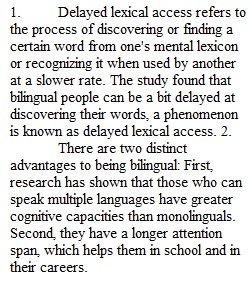


Q • Watch the following two videos about the cognitive advantages of bilingualism and playing a musical instrument then answer the questions below. o Does Being Bilingual Make You Smarter? (Links to an external site.) o How playing an instrument benefits your brain - Anita Collins (Links to an external site.) Questions 1. Define delayed lexical access. 2. List two distinct advantages of being bilingual. 3. Review your notes and describe how an fMRI scan and a PET scan function. 4. Explain which lobe the motor, visual, and auditory cortices are located. Opinion: Both videos discuss the nature vs nurture argument portrayed in chapter 3. In response to this question, I want to know a little more about each of you. Do you speak more than one language? Do you play a musical instrument? Did you learn this skill at a younger age or later in life? What distinct advantages do you notice accompany your skill? **(If you don’t speak two languages nor play an instrument, defend one as being more beneficial from both a mental and social perspective)** Perform the following tasks: • Step 1: Post your initial response to the discussion topic on the discussion board (250 words). (This is due by Thursday) • Step 2: Read other students' posts and respond to at least two other students (100 words). (This is due by Sunday) • Step 3: Instructor reviews posts.
View Related Questions